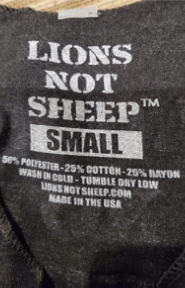The Federal Trade Commission today took action against apparel company Lions Not Sheep Products, LLC, and its owner Sean Whalen for falsely claiming that its imported apparel is Made in USA. According to the FTC’s complaint, the company added phony Made in USA labels to clothing and accessories imported from China and other countries. The FTC’s proposed order requires Lions Not Sheep and Whalen to stop making bogus Made in USA claims, come clean about foreign production, and pay a monetary judgment.
“Companies that slap phony Made in USA labels on imported goods are cheating their customers and undercutting honest businesses, and we will hold those companies and their executives accountable for their misconduct,” said Sam Levine, Director of the FTC’s Bureau of Consumer Protection. “American consumers have the right to know the truth about where their clothes and accessories are made.”
Utah-based Lions Not Sheep is an apparel company that sells t-shirts, sweatshirts, jackets, and sweaters on their own website as well as through Amazon and Etsy. The company and its owner Whalen heavily marketed it through social media channels, claiming that it would “show people it’s possible to live your life as a LION, Not a sheep.” Their Made in USA claims online and on product labels included “Made in the USA,” “Made in America,” “Are your products USA Made?” “100% AMERICAN MADE,” and “BEST DAMN AMERICAN MADE GEAR ON THE PLANET.” In most cases, the products advertised using these claims consist of wholly imported shirts and hats with limited finishing work performed in the United States.
The complaint alleges that on Oct. 8, 2020, Whalen published a video of himself to his social media accounts, with the title MADE IN AMERICA! alongside a Chinese flag. In the video, Whalen said he could conceal the fact that his shirts are made in China by ripping out the origin tags and replacing them with tags stating that the merchandise was made in the United States.
According to the complaint, between May 10, 2021 and Oct. 21, 2021, Whalen and Lions Not Sheep removed tags disclosing that the merchandise was made in a foreign country and printed “Made in USA” at the neck of the shirts, as depicted below:

Enforcement Action
The proposed order settling the FTC’s complaints against Whalen and Lions Not Sheep prohibits the conduct alleged in the complaint. The order requires that Whalen and Lions Not Sheep:
- Pay judgment: They must pay a judgment of $211,335.
- Cease making bogus Made in USA claims: They must stop claiming that products are made in the United States unless they can show that the product’s final assembly or processing—and all significant processing—takes place here and that all or virtually all ingredients or components of the product are made and sourced here. Under the terms of the proposed order, Whalen and Lions Not Sheep are prohibited from labeling products as “Made in USA” unless the final assembly or processing, and all significant processing that goes into the products occur in the United States; and unless all or virtually all ingredients or components of the products are made and sourced in the United States. They must also submit compliance reports.
- Come clean about foreign production: Under the order, any qualified Made in USA claims must include a clear and conspicuous disclosure about the extent to which the product contains foreign parts, ingredients or components, or processing. Finally, to claim that a product is assembled in the United States, Whalen and Lions Not Sheep must ensure that it is last substantially transformed in the United States, its principal assembly takes place in the United States, and U.S. assembly operations are substantial.
The FTC’s Enforcement Policy Statement on U.S. Origin Claims provides further guidance on making non-deceptive “Made in USA” claims.
The Commission vote to issue the complaint and accept the consent agreement was 4-0. The FTC will publish a description of the consent agreement package in the Federal Register soon. Instructions for filing comments appear in the published notice. Comments must be received 30 days after publication in the Federal Register. Once processed, comments will be posted on Regulations.gov.
NOTE: When the Commission issues a consent order on a final basis, it carries the force of law with respect to future actions. Each violation of such an order may result in a civil penalty of up to $46,517.